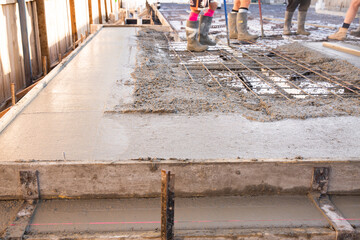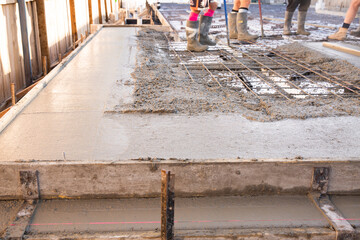Concrete is one of the most versatile and durable materials used in construction, playing a crucial role in residential, commercial, and industrial projects. Whether it’s driveways, patios, foundations, or sidewalks, high-quality concrete work ensures safety, stability, and aesthetic appeal. Hiring professional concrete contractors guarantees expert installation, proper curing, and long-lasting results. Understanding the services, benefits, and selection process for concrete contractors helps property owners make informed decisions for their projects.
Why Hiring Concrete Contractors Matters
While pouring concrete may seem straightforward, achieving a smooth, durable, and level surface requires skill, experience, and specialized tools. Concrete contractors bring technical knowledge and practical expertise to every project. They ensure the correct mix, proper site preparation, and precise finishing techniques.

Improperly installed concrete can lead to cracks, uneven surfaces, and premature deterioration. Professional contractors prevent these issues, saving time and money while enhancing the structural integrity of the property. Moreover, experienced contractors adhere to safety protocols, protecting workers and property during construction.
Services Offered by Concrete Contractors
Concrete contractors provide a wide range of services to meet various project needs:
- Residential Concrete Work – Driveways, sidewalks, patios, and garage floors receive precise installation and finishing.
- Commercial Concrete Services – Parking lots, walkways, and industrial floors are constructed to withstand heavy use.
- Foundations and Slabs – Concrete contractors ensure strong and level foundations for homes, offices, and buildings.
- Decorative Concrete – Stamped, stained, or polished concrete adds style and unique character to floors and surfaces.
- Repair and Maintenance – Cracks, spalling, and uneven surfaces are repaired to restore strength and appearance.
- Concrete Removal and Replacement – Old or damaged concrete is safely removed and replaced with high-quality materials.
By offering comprehensive services, contractors can handle every aspect of a concrete project, from planning to finishing touches.
Benefits of Hiring Professional Concrete Contractors
Hiring experienced concrete contractors offers multiple advantages:
- High-Quality Workmanship – Contractors ensure smooth, even surfaces and accurate leveling for long-lasting results.
- Time Efficiency – Skilled teams complete projects quickly without compromising quality.
- Durability and Strength – Proper installation techniques increase the lifespan of concrete surfaces.
- Expert Advice – Contractors provide recommendations on materials, finishes, and design options.
- Compliance with Standards – Professionals follow building codes and safety regulations to ensure reliable results.
These benefits make professional concrete services an essential investment for any property improvement or construction project.
Tips for Hiring Concrete Contractors
Selecting the right concrete contractor ensures a successful project. Consider these tips:
- Verify Credentials – Check licenses, insurance, and certifications to ensure professionalism and protection.
- Ask for References – Review past projects and client feedback to evaluate experience and quality.
- Get Detailed Estimates – Compare costs, materials, and timelines from multiple contractors.
- Discuss Materials and Mix – Ensure contractors use the right concrete mix for strength and durability.
- Clarify Scope of Work – Confirm site preparation, finishing, curing, and cleanup are included.
- Plan Ahead – Schedule contractors in advance, especially during peak construction seasons.
Following these steps helps property owners avoid costly mistakes and ensures a smooth construction process.
Preparing for a Concrete Project
Proper preparation is critical for successful concrete installation:
- Site Assessment – Evaluate soil, drainage, and slope to prevent future cracks and uneven surfaces.
- Clear the Area – Remove debris, plants, and old materials for a clean work zone.
- Mark Dimensions – Clearly define boundaries to guide accurate pouring and finishing.
- Ensure Access – Make sure equipment and vehicles can reach the site without obstacles.
- Plan for Curing – Concrete requires proper curing time; plan the schedule to allow the material to harden and strengthen.
Preparing the site ensures efficiency, reduces delays, and improves overall results.
Common Challenges in Concrete Work
Even with professional contractors, concrete projects may encounter challenges:
- Weather Conditions – Extreme heat, cold, or rain can affect curing and finishing.
- Soil Movement – Shifting or unstable soil can lead to cracks or uneven surfaces.
- Incorrect Mix – Using the wrong concrete mix reduces durability and strength.
- Poor Drainage – Inadequate drainage causes water pooling and surface damage.
- Time Constraints – Rushing the project can compromise quality and finish.
Experienced concrete contractors anticipate and address these challenges, ensuring a durable and high-quality outcome.
Decorative and Functional Concrete Options
Modern concrete contractors offer options beyond traditional gray slabs. Decorative concrete enhances visual appeal while maintaining strength:
- Stamped Concrete – Creates patterns resembling stone, brick, or tile.
- Colored Concrete – Integrates pigments for unique tones and finishes.
- Polished Concrete – Produces a smooth, reflective surface ideal for interiors.
- Exposed Aggregate – Displays natural stone textures for an elegant and durable finish.
These options combine functionality with aesthetics, allowing property owners to create spaces that are both practical and visually appealing.
Concrete Maintenance Tips
Maintaining concrete ensures longevity and preserves its appearance:
- Regular Cleaning – Sweep and wash surfaces to prevent dirt buildup and staining.
- Seal Coating – Apply a sealant to protect against water, chemicals, and wear.
- Prompt Repairs – Address cracks, chips, or spalling early to prevent further damage.
- Avoid Heavy Impact – Limit heavy machinery or vehicles on decorative concrete to maintain integrity.
- Monitor Drainage – Ensure proper water flow to prevent pooling and erosion.
Routine maintenance keeps concrete surfaces strong, safe, and attractive for years.
Concrete contractors play a vital role in construction, renovation, and property improvement projects. Their expertise, tools, and techniques ensure that concrete surfaces are durable, safe, and visually appealing. From residential driveways and patios to commercial foundations and decorative flooring, professional contractors deliver high-quality results that stand the test of time.
Proper planning, preparation, and maintenance further enhance the longevity and performance of concrete surfaces. By hiring skilled concrete contractors, property owners benefit from professional workmanship, time efficiency, and long-lasting results that add value and beauty to their spaces.

